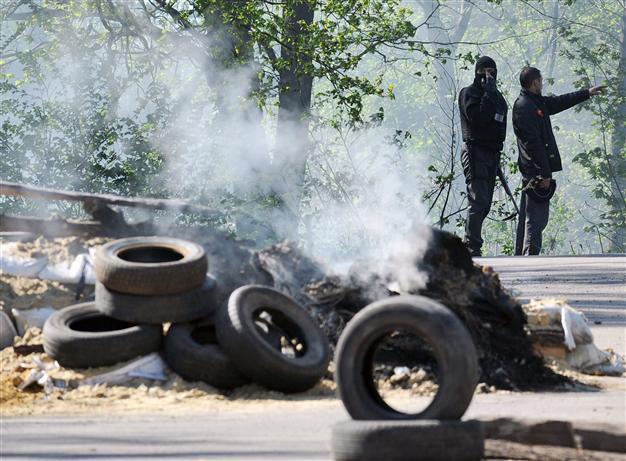Ukraine on 'combat alert' as rebels gain ground
HORLIVKA, Ukraine - Reuters

AFP Photo
Ukraine's armed forces are on "full combat alert" against a possible Russian invasion, Kiev said Wednesday, as pro-Kremlin insurgents tightened their grip on the increasingly chaotic east of the country.Rebels stormed the regional police building and town hall in the eastern Ukrainian city of Gorlivka, local officials told AFP, adding to more than a dozen locations already under their control.
The new seizure followed clashes in nearby Lugansk late Tuesday, as hundreds of pro-Russia protesters spearheaded by a heavily armed mob attacked the police station.
On Wednesday, the rebels lifted their siege of the building after the police chief promised to step down.
Ukraine's interim president Oleksandr Turchynov told his cabinet the nation's armed forces were on "full combat alert" as fears grew in Kiev that Russia could mount an armed invasion of the ex-Soviet republic.
"The threat of Russia starting a war against mainland Ukraine is real," he said.
Turchynov urged "Ukrainian patriots" to bolster the beleaguered police force, which he has criticised for "inaction and in some cases treachery". His priority was to prevent "terrorism" spreading in the restive east of the country, he said.
Police are "helpless" and "some of them even help and cooperate with the separatists," he charged.
Yulia Tymoshenko, a former prime minister who is a frontrunner for presidential elections on May 25, said Ukraine was "under attack" from Russia which had started an "undeclared war" against her country.
The West has accused Russia of fomenting the crisis and backing the rebels and has imposed sanctions to try to get Moscow to back down.
The United States and EU members see the insurgency as a bid to destabilise Ukraine ahead of the elections but Moscow denies it has a hand in the rebellion.
President Vladimir Putin insisted to reporters late Tuesday that there were "neither Russian instructors, nor special units, nor troops" operating in Ukraine.
Opening another front in the war of words between Washington and Moscow, Putin warned the sanctions against his country could harm Western interests in Russia's lucrative energy sector.
"If this continues, we will of course have to think about how (foreign companies) work in the Russian Federation, including in key sectors of the Russian economy such as energy," said Putin, speaking at a regional summit in Minsk.
The Russian president's comments threaten the operations of some of the world's biggest energy companies in the resource-rich country -- once viewed as a reliable alternative to unstable natural gas and oil-producing countries in the Middle East.
The EU said talks with Russia and Ukraine will take place in Warsaw on Friday to try to resolve a $3.5-billion gas bill Gazprom calculates Kiev owes. Putin has threatened to cut off the gas flow to Ukraine if it is not quickly paid.
Russian officials have accused the United States of wanting to reinstitute "Iron Curtain"-style policies and warned the sanctions would "boomerang" back to hurt it.
But the tensions are already having an impact on the Russian economy, which the International Monetary Fund announced Wednesday was already "experiencing recession".
The IMF drastically slashed its 2014 growth forecast for Russia to 0.2 percent from 1.3 percent, amid massive capital outflows over the Ukraine crisis.
US moves to restrict high-tech exports to Russia appeared to touch a nerve in Moscow, which warned Washington was "exposing their astronauts" on the International Space Station to consequences.
Moscow has also taken aim at Japan and the European Union, which it accused of "doing Washington's bidding" for joining in the coordinated sanctions push.
But Washington would not let up on Moscow, as relations between them reached a low not seen since the end of the Cold War.
Vowing to "defend every single inch" of NATO territory, US Secretary of State John Kerry urged Moscow to "leave Ukraine in peace".
Although Ukraine is not a NATO member, several of its neighbours are, and the Pentagon is boosting military support for them as they express concerns over Russia's actions.
In particular, the US is planning to beef up training exercises planned for June in the Baltic states.
In a small chink of light amid what EU foreign policy supremo Catherine Ashton called a "downward spiral of violence and intimidation", there were hopes a team of kidnapped international monitors from the OSCE could soon be freed.
The rebel leader in the flashpoint town of Slavyansk said late Tuesday that there had been "good progress" in talks to free the seven European officials and hoped for a "positive outcome".
"Negotiations are continuing," a rebel spokeswoman told reporters on Wednesday, adding there was "a more positive atmosphere than before".
However, another top rebel leader in Slavyansk, Igor Strelkov, said that while he was prepared to free the monitors, he was waiting for contact from Kiev.
Putin said he hoped the OSCE team's situation "will be resolved and that they are able to freely leave the territory (of Ukraine)".
But he laid the blame for the detentions squarely at Kiev's door.
"If the government -- or those who now call themselves the government -- invited some sort of observers... then these (officials) should have understood that they were entering a conflict zone, a region of the country that does not recognise the authorities' legitimacy," he said.
"They should have thought about that in advance, and agreed (their mission) with the people who control this territory."
The crisis in Ukraine has slipped rapidly into a global confrontation since February, when Moscow-backed president Viktor Yanukovych was forced out after months of increasingly bloody protests.
In response, Moscow launched a blitz annexation of the peninsula of Crimea, and stepped up troops deployments on the border.
















